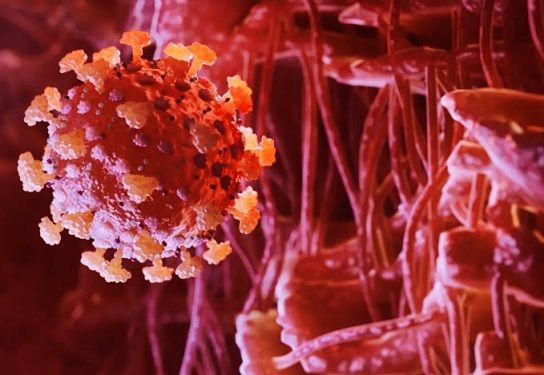Estonian Study Claims That Possible Hidden Cause of Long COVID May Be a Burnt-Out Immune System!
Nikhil Prasad Fact checked by:Thailand Medical News Team May 31, 2025 8 months, 3 weeks, 3 days, 23 hours, 29 minutes ago
Thailand Medical News: In a new study by researchers from the University of Tartu, Tartu University Hospital, the South-Estonian Hospital, and the Estonian Research Council, scientists have uncovered alarming evidence that long COVID might be driven by a depleted and exhausted immune system rather than persistent inflammation. This new insight dramatically shifts how we understand the lingering effects of SARS-CoV-2 and could reshape how long COVID is diagnosed and treated in the future.
 Estonian Study Claims That Possible Hidden Cause of Long COVID May Be a Burnt-Out Immune System!
Estonian Study Claims That Possible Hidden Cause of Long COVID May Be a Burnt-Out Immune System!
While long COVID has been widely associated with chronic inflammation, this
Thailand Medical News report uncovers findings suggesting the opposite may be true in many cases. Instead of immune overactivation, the body’s immune system appears to taper off and even become suppressed months after the initial infection.
A Closer Look at the Study
The research team conducted a longitudinal analysis on 60 individuals who had symptomatic COVID-19 and followed them for six months. Using advanced proteomics, specifically the Olink® Target 96 Inflammation Panel, they measured 92 inflammation-related biomarkers in the blood of these patients. These were then compared to samples from 45 individuals with non-COVID respiratory infections.
Follow-up blood samples were collected at the three- and six-month marks. Patients were classified into two groups: those who recovered fully (R) and those who exhibited long COVID symptoms (LC), such as fatigue, cognitive issues, breathlessness, and chest pain.
At three months, nearly half of the COVID-19 patients still reported symptoms. By six months, the percentage had jumped to 66%. Surprisingly, the data showed that in long COVID patients, there was no prolonged elevation of proinflammatory biomarkers. Instead, many of these biomarkers were significantly reduced over time.
Biomarker Shifts Indicate Immune Suppression
At three months, the only biomarker that stood out was CCL4, which was slightly elevated in COVID-19 patients compared to the control group. By the six-month mark, only CST5 remained elevated. In contrast, 14 different inflammatory proteins had declined in patients with long COVID.
Notable biomarkers like MCP-2, MCP-4, IL2RB (a receptor involved in immune cell survival), and LAP-TGFβ1 (a protein linked to tissue repair and fibrosis) were significantly lower in long COVID patients than in those who had fully recovered. These drops suggest that the immune system was no longer just quiet — it may have been switched off or exhausted entirely.
Furthermore, multivariate predictive models developed in the study showed that these biomarker shifts — along with severity of the initial infection — could help identify which patients were most likely to develop long COVID. At six months, those who had a more severe acute infection were significantly more likely to experience lingering symptoms.
&nbs
p;
Fatigue and Clotting Abnormalities Linked to Key Proteins
A deeper dive into those who experienced general symptoms such as fatigue and exercise intolerance revealed something else: an increase in a protein called urokinase-type plasminogen activator (uPA), which is involved in breaking down blood clots. This finding aligns with previous studies that showed microclots — tiny, persistent blood clots resistant to natural breakdown — in long COVID patients. These clots have been linked to fatigue and even muscle pain, further complicating recovery.
Conclusion
This landmark study challenges the long-held belief that long COVID is primarily caused by ongoing inflammation. Instead, it suggests that the immune system may enter a state of functional shutdown or exhaustion months after SARS-CoV-2 infection. The data show a distinct pattern: an early wave of low-grade inflammation that fades into immune suppression, not recovery. This could explain why some individuals struggle with symptoms for months despite appearing “healed” on paper.
Identifying this suppressed immune signature and understanding how it relates to disease severity and symptoms like fatigue may help guide future diagnostics and treatment. It also underscores the importance of long-term monitoring and reinforces that long COVID is a real, biologically complex condition - not one that can be explained away by psychosomatic theories.
The study findings were published in the peer reviewed journal: Medicina
https://www.mdpi.com/1648-9144/61/6/996
For the latest on Long COVID, keep on logging to
Thailand Medical News
Read Also:
https://www.thailandmedical.news/news/low-dose-naltrexone-could-be-the-key-to-reversing-immune-dysfunction-in-long-covid-patients
https://www.thailandmedical.news/news/alarming-changes-in-transitional-b-cells-reveal-hidden-immune-dysregulation-in-long-covid-sufferers
https://www.thailandmedical.news/news/lef1as1-gene-disruption-could-be-driving-long-covid-symptoms-in-some-patients
https://www.thailandmedical.news/articles/coronavirus
https://www.thailandmedical.news/articles/long-covid
https://www.thailandmedical.news/pages/thailand_doctors_listings
